* One of the most exciting things to happen on Broadway in the last few decades has been the onslaught of first-rate revivals of classic musicals. In the old days, revivals were frequent and often short-run reproductions of the original staging of a show — sometimes not in a typical Broadway house — playing instead at City Center or Lincoln Center's New York State Theater. Then, there were the star packages with originals stars recreating their signature performances, in some cases in seeming perpetuity, such as Yul Brynner in The King and I or Carol Channing in Hello, Dolly!
What we've seen more recently is completely new productions, sometimes drastically reconceiving a piece (to various degrees of success) to introduce the material to a new audience. If these revivals, at times, unfortunately outnumbered quality original productions, that's the subject of another column.
Click through to read, chronologically, my choices for the Top Ten Broadway Musical Revivals of the last 25 years.
| |
 |
|
| Faith Prince and Nathan Lane in Guys and Dolls. | ||
| Photo by Martha Swope |
Following in the footsteps of his own smash hit Lincoln Center Theater revival of Anything Goes (which falls, tragically, outside my stretch of theatregoing years, and, therefore, the bounds of this list), Jerry Zaks brought another Golden Age Broadway musical comedy swirling to life with Guys & Dolls. Zaks's secret to success was a candy-colored world crackling with hilarity that somehow still seemed real and captured a romantic longing for love and life and the Big Apple. Towering at the center of this world were larger-than-life, yet completely truthful, performances from Nathan Lane and Faith Prince as Nathan Detroit and Miss Adelaide, immediately establishing Lane and Prince as Broadway musical megastars of the highest wattage. The rest of the cast was wonderful — as was the choreography, the orchestrations and every element of this joyous theatrical experience.
| |
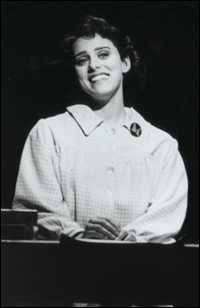 |
|
| Kuhn in She Loves Me. | ||
| Photo by Carol Rosegg |
The Roundabout Theatre Company's acclaimed revival of She Loves Me lost something in its move from the Roundabout's former Broadway house, the invaluably intimate Criterion Center Stage Right, to the Brooks Atkinson. Even more damaging than the inferior new home, She Loves Me got an inferior new leading lady as the dreamy Judy Kuhn had to depart the role of Amalia due to a previous commitment. Still, She Loves Me sparkled on the strength of its flawless book and score, as well as a charming production, perfectly cast with doubly gifted actor-singers Boyd Gaines, Sally Mayes and Howard McGillin, not to mention extremely satisfying supporting turns from Louis Zorich, Lee Wilkof, Brad Kane and Jonathan Freeman.
| |
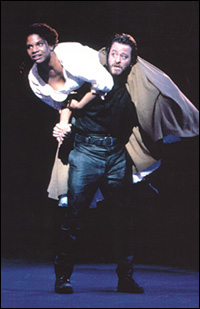 |
|
| Audra McDonald and Fisher Stevens in Carousel. | ||
| Photo by Joan Marcus |
The Lincoln Center Theater revival of Carousel had three enormous assets going for it: Bob Crowley's unflaggingly emotional and unfailingly rapturous set and costume design, Nicholas Hytner's searing direction of a company of legitimate actors who never condescended to the material and that company's brightest light, Audra McDonald, exhilarating and enchanting in her first major role, Carrie Pipperidge. Some balked at Michael Hayden's vocal deficit in comparison with past Billy Bigelows like John Raitt and Gordon MacRae, but Hayden's performance, singing included, was beautiful and tremendously feeling — words that aptly describe the entire production.
| |
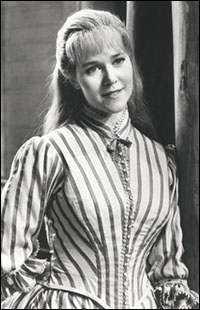 |
|
| Rebecca Luker in Show Boat. | ||
| Photo by Catherine Ashmore |
Harold Prince can count a plethora of landmark productions among his achievements — and his 21 Tony Awards — but without a doubt, his mammoth, sweeping revival of Show Boat ranks high among them. Show Boat represents the epitome of the first generation of "serious" book musicals, out of which tradition Prince ultimately carved his own recipe for the future. It is fitting that he looked backwards and created this definitive version of the much-revised Show Boat for the ages. His gargantuan, yet seamless, production engaged its audience in the political and historical context for this story and dazzled with sublime performances of this nearly all-standards score by an ideal cast including Elaine Stritch, John McMartin, Rebecca Luker, Mark Jacoby, Michel Bell and an especially affecting Lonette McKee.
| |
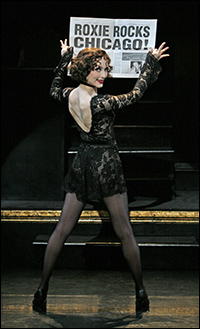 |
|
| Bebe Neuwirth |
A clear choice for this list is Chicago, the longest-running Broadway revival in history, and third longest-running production, after The Phantom of the Opera and Cats. Producers Barry and Fran Weissler were wise indeed to move the City Center Encores! concert presentation to Broadway, maintaining its stark, spare, style, with emphasis on the scintillating piece itself, as created by Bob Fosse, John Kander and Fred Ebb. They've also kept a steady stream of bold-faced names going into the show and generating box office for years and years — although it's unlikely many Roxies and Velmas to come will equal the original revival stars Ann Reinking and Bebe Neuwirth.
| |
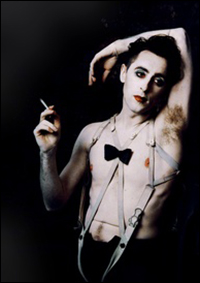 |
|
| Alan Cumming |
Sam Mendes's inspired revival of Cabaret built on everything the original production had going (namely sex, politics and Kander & Ebb) and then took it a step further, as was now possible in the post-sexual revolution/gay liberation years the Mendes version ran. This was of tremendous value to the piece, as the primary source material is, after all, Christopher Isherwood's "Berlin Stories," which depict the very cultural elements (of Weimar Berlin) that 1960s Broadway wouldn't have accepted when Cabaret first opened. But then, Mendes' Cabaret wasn't just sexually fluid, it was also staggeringly well acted and performed with jackknife theatricality by a peerless cast that featured Alan Cumming, Natasha Richardson and Mary Louise Wilson.
| |
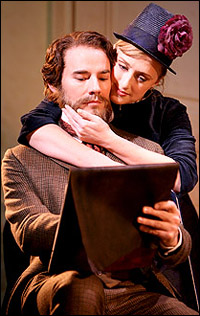 |
|
| Daniel Evans and Jenna Russell in Sunday... | ||
| Photo by Joan Marcus |
Stephen Sondheim and James Lapine's Pulitzer Prize-winning 1984 Sunday in the Park with George is a masterpiece of sensitivity and insight, and it's a godsend that Mandy Patinkin and Bernadette Peters' unmatchable performances in the original production were preserved on video. Also preserved on the same video is the "Chromolume," a 1984 attempt at the technology heavily referenced in the second act. Watching the video now, this looks dated and somewhat diminishes the impact of some of Sondheim and Lapine's most exquisite material. In his revival, Sam Buntrock reversed that damage, using video projection to create a modern stage vocabulary that streamlined the central tech elements and rendered the work both state-of-the-art and classic. Beyond that, Buntrock incorporated this technique into the 19th-century first act, lending the entire show a new integrity and wholeness.
| |
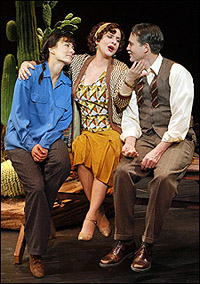 |
|
| Laura Benanti, Patti LuPone and Boyd Gaines | ||
| Photo by Paul Kolnik |
Arthur Laurents wrote the book to Gypsy, but he didn't direct the original 1959 production starring Ethel Merman; that was Jerome Robbins. Conventional wisdom has it that Robbins's original Gypsy and both Laurents's 1974 and 1989 revivals, starring Angela Lansbury and Tyne Daly, provided some of the greatest evenings in musical theatre history. Speaking only from my own limited experience, Laurents's 2008 revival holds that honor free and clear. Widely acknowledged as the greatest American musical, Gypsy has no shortage on comedy, drama or top-drawer showtunes, and this revival triumphed in each of those departments. Laurents' production this time around was lean (perhaps a bit too lean) and mean (some might say bitchy), effectively maintaining focus on the story and characters as depicted by a top-to-bottom ideal cast. But the main event of any Gypsy is its Rose, and Patti LuPone, at the remarkable peak of her formidable powers, gave the performance of her career, mining Madame Rose for every ounce of humanity and every spark of theatricality in a tour de force that coaxed and cajoled and climaxed and came back again, ultimately exploding in a daring "Rose's Turn" that was thrilling and chilling to the bone. The next revival of Gypsy will have a tough act to follow.
| |
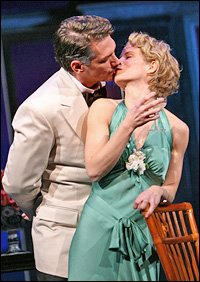 |
|
| Paulo Szot and Kelli O'Hara | ||
| Photo by Joan Marcus |
South Pacific features what is probably Rodgers & Hammerstein's richest score. Certainly the Overture is a truly glorious piece of music, or the sequence of "Twin Soliloquies" leading into "Some Enchanted Evening." The 2008 Lincoln Center Theater revival (the show's first Broadway revival since its premiere in 1949) successfully confronted the main obstacle facing any production of South Pacific: How to hit all these emotional heights without coming across as saccharine. Bartlett Sher's elegant production sumptuously designed by Michael Yeargan, ennobled the material with an epic scope that invigorated the experience. This majestic incarnation was worth the wait.
| |
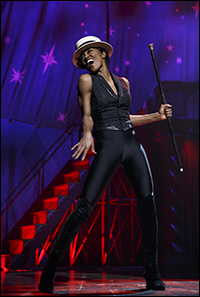 |
|
| Patina Miller | ||
| Photo by Joan Marcus |
One of the biggest hits of the 1970s, the success of the original production of Pippin is universally attributed to Bob Fosse. Stephen Schwartz's score has its pleasures and, business-wise, the original production was one of the first Broadway shows to make savvy use of TV commercials, but the piece itself was Fosse's baby. For years, this left a big question mark where any potential revival would have been. After all, direction is more than just staging; it asks how to do what Fosse did without paling in comparison. The material isn't strong enough to support a bare bones take a la Chicago. The solution came in the assured direction of Diane Paulus, whose reconception of Pippin, not as vaudeville, but as circus, electrified the Broadway season and is set to delight audiences for years to come.
(Ben Rimalower is the author and original star of the critically acclaimed Patti Issues. Read Playbill.com's coverage of the solo show here. Visit him at benrimalower.com and follow @benrimalower on Twitter.)










